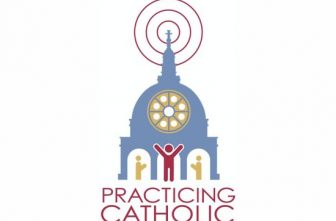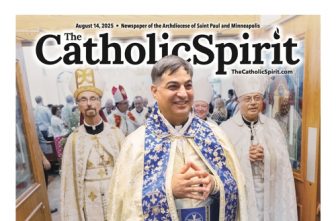As the Church approaches the 60th anniversary of the release of “Nostra Aetate” (“In our Time”), its messages apply today, said Father Erich Rutten, pastor of Christ the King and St. Thomas the Apostle parishes in Minneapolis. The conversation behind the document likely started around 1960, about 15 years after the end of World War II and the horrors of the holocaust. The document is often considered the Second Vatican Council’s declaration on the relation of the Church to non-Christian religions, promoting respect and dialogue.
“The anti-Semitism that we saw in the Second World War, we’re seeing after this conflict started between Israel and Hamas; we’re seeing somewhat of a showing of that, of revealing that some of that residual anti-Semitism remains,” which cannot be tolerated, said Father Rutten, who also serves the archdiocese in supporting ecumenical and interreligious affairs.

Father Rutten recently joined “Practicing Catholic” radio show host Patrick Conley to share his thoughts on and experience with interfaith relationships. What started as a document “specifically about the Church’s relationship with Judaism was expanded to speak also about Muslims … all faiths and our relationship with all faiths,” he said.
“The lessons of ‘Nostra Aetate’ are that, really, we share a common humanity,” he said. “We’re all one origin. We’re all seeking to know where we came from and where we’re going. All of that provides a context even today for engagement and dialogue, and not battles,” he said.
Vatican II was followed by “an outpouring of excitement” around “engaging one another,” Father Rutten said. Centers for dialogue were created, he said, including the Jay Phillips Center at the University of St. Thomas in St. Paul.
“It just renews the importance of doing that today,” Father Rutten said. “The way forward, as Pope Francis keeps telling us, is not retrenchment, but is even more to engage one another and to dialogue with one another. The word he loves is ‘encounter’ one another, not simply as the other, but really as a brother or sister. Very important, especially in our times.”
Besides attending events sponsored by organizations, Father Rutten said engaging with those of other faiths can “happen quite locally.” For example, a parish could host an event for its neighbors. Or consider a parish prayer event during Advent, he said.
“There’s so much going on in our lives and in our world, but it becomes a priority when you see the fighting not only in Gaza, but also the anti-Semitism that we’re experiencing even all around,” Father Rutten said.
To hear more of Father Rutten’s thoughts on engaging and having dialogue with people of other faiths, listen to this episode of “Practicing Catholic,” which debuts at 9 p.m. Dec. 1 on Relevant Radio 1330 AM and repeats at 1 p.m. Dec. 2 and 2 p.m. Dec. 3.
Produced by Relevant Radio and the Archdiocese of St. Paul and Minneapolis, the latest show also includes an interview with Father John Paul Erickson, pastor of Transfiguration in Oakdale, who discusses how the faithful can more fully enter into the Advent season; and School Sister of Notre Dame Stephanie Spandl, who describes her call to a religious vocation and where and how the sisters serve the local Church.
Listen to interviews after they have aired at PracticingCatholicShow.com or choose a streaming platform at https://anchor.fm/practicing-catholic-show.




